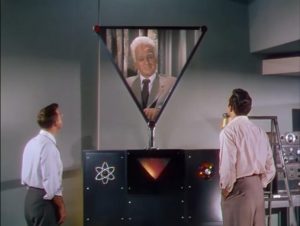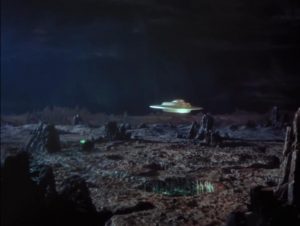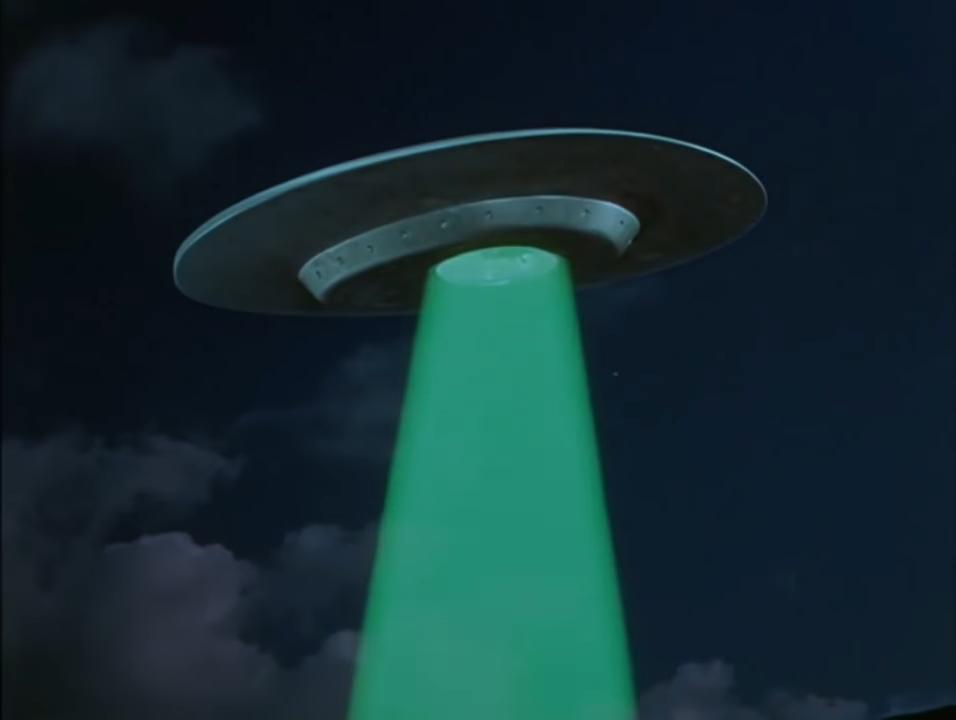Michael Stevens, of Vsauce fame, once said that “the ways we imagine [aliens] helping us, say a lot about the kind of help we think we need.” Could the inverse be true? Thankfully, 1955’s This Island Earth delves into that question.
Rex Reason plays Cal Meacham, a scientist working on new forms of unlimited nuclear energy. After a mysterious source sends Cal a puzzle, in the form of electronic and machine parts, Cal assembles an “Interocitor” – an audio-visual communication device. Once assembled, Cal is contacted by Exeter (Jeff Morrow), who entices him to join his scientific team at once. Intrigued, Cal is flown (by a mysterious, unmanned plane) to Exeter’s mansion in rural Georgia. There, he meets Ruth Adams (Faith Domergue), a scientist working in the same field. Things seem strange at the mansion, and Exeter’s mission statement of ending wars is highly suspect. Cal and Ruth’s suspicions are answered when Exeter reveals himself to be of alien origin, from the planet Metaluna. Taking Cal and Ruth aboard his spaceship and heading for home, he explains the dire conflict his planet is in, and of his need for their help to save Metaluna…
This Island Earth gets better with each viewing, allowing for new discoveries of meaning. The story is fascinating. The idea of an alien race reaching out to humanity for help is exciting, as well as somewhat melancholic. A planet ravaged by ceaseless conflicts becomes the final hope of another planet doomed by war.
You could be forgiven for disregarding This Island Earth based on its first act. The dialogue is, at first, stilted and delivered with an air of machismo from Rex Reason that would make Zapp Brannigan positively proud. The fact that the pace is initially sluggish doesn’t help either, but as soon as Cal has assembled the Interocitor, all comes together.

The cast’s performances are, on the whole, quite good. Rex Reason fills the character of Cal better as the film goes on. Owing a lot to the clunky dialogue in the first act, Cal seems less of a character and more of a scientific interpreter for the audience, waxing lyrical about electronics and power sources. Yes, this establishes his occupation and expertise, but it doesn’t immediately make for a living, breathing character.
Faith Domergue is good as Ruth Adams, though her similar scientist role in 1955’s It Came from Beneath the Sea served her abilities better. Again, the script here lets her down too, as she’s allowed to do little more than react to the proceedings – especially once we’ve reached Metaluna. However, the restrained unease she projects while at Exeter’s mansion in the first act is commendable, and effectively adds to the mystery.
However, it is Jeff Morrow as Exeter, the envoy from Metaluna, who makes this film. His performance is one that realises the profound statements This Island Earth has to offer. As we learn, under instructions from The Monitor (the apparent Metalunan leader), Exeter has placed some of the scientists at his mansion under the “transformer”, a device to suppress their will and force them to work for their cause.
Initially, we’re unsure of Exeter when we’re introduced. We hear his spiel about “ending wars” when he pitches to Cal. Indeed, the presentation leads you to believe that it is just that: spiel to hide something sinister. However, by the film’s end, one sees that the mantra was not so much that of the Metalunans, but of Exeter himself. He believes in the humanity of Cal and Ruth, and clearly struggles with the nastier things his masters expect of him. Exeter’s line, “we’re not all masters of our souls” is used to great effect. Exeter’s smaller moments of challenge to his leaders culminate in his ultimate defiance, choosing not to allow Cal or Ruth’s minds to be “transformed”, preserving their free will at the arguable expense of his own planet’s survival.
This Island Earth is fascinating in that key theme: of the importance of morality in the face of crises that defy it. Exeter is forced to abandon his ethics time and again because of the doom that looms over Metaluna. However, at the crucial moment, his morality prevails, and he prevents the further personal destruction of those he cares for – of those who care for him.
Could more have been made of Exeter? Of course. Delving deeper into his motives and personal morality could have been fascinating, adding to an already-rich discussion of right, wrong, and how they matter in times of crisis. However, what we are ultimately presented with is not without merit. More details of the Metalunans’ war would have been equally satisfying, as we never truly learn of its scope or history, but Exeter is interesting enough to overlook this.

This Island Earth boasts terrific production design. The look of the Interocitor is wonderfully bizarre, as is the surreal sound design that accompanies it. The eerie, chilling surface of Metaluna is superb. It is a ghostly world that has clearly seen untold horrors. The aerial photography that sees Exeter’s ship descend through the planet’s surface complements the set design brilliantly.
Of course, any discussion of This Island Earth would be incomplete without mentioning the infamous Metaluna Mutant. An inspired creation, the Mutant monster is fantastic in its presentation, towering above Faith Domergue as it menaces Ruth Adams. The Mutant is, admittedly, superfluous to the story, adding little except to further prove the Metalunans’ scientific prowess. However, the Mutant’s appearance arguably adds another layer of the unearthly to the happenings on Metaluna. At the very least, the Mutant is a sight to behold, equal parts amusing and monstrous. This Island Earth is better for it.

This Island Earth has its share of script issues that inhibit the actors from truly fleshing out their characters. However, Jeff Morrow’s Exeter lifts the story tremendously, injecting pathos and nuance to a role that could have been marred if played without Morrow’s dedication. This Island Earth presents ideas about personal morality and its importance in the face of morality-shattering crises. Exeter embodies that discussion, and is framed by all the science-fiction spectacle of interplanetary war. This is a film that allows for new discoveries upon each viewing, so take another look and enjoy – even if only for the wonderful Metaluna Mutant…

